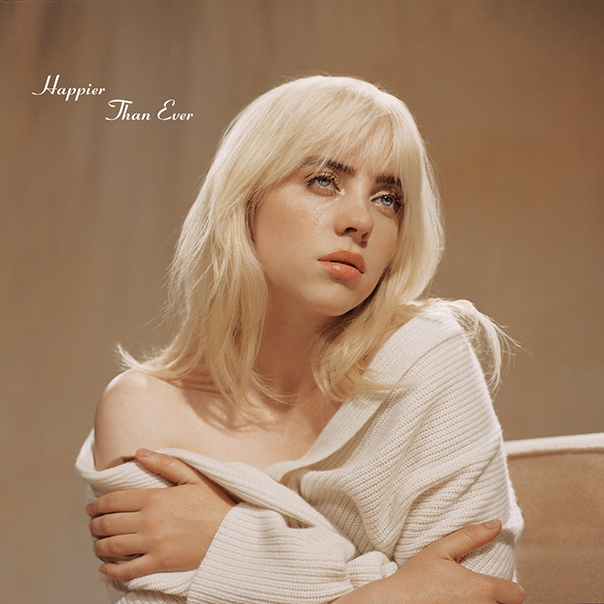REVIEW: Billie Eilish swears she’s ‘Happier Than Ever’ on sophomore LP

Billie Eilish, “Happier Than Ever.”
Of all the pop stars impacted by the pandemic, Billie Eilish had her trajectory altered the most. On top of the world and set to embark on a nationwide arena tour, Eilish scrapped the tour and set her focus on her sophomore record. The second release for a breakout artist comes with pressure, but she faced more than most. They key question becomes whether an artist embraces the style that brought her success, or pivots to something entirely different. In the case of Happier Than Ever, the answer is the later.
Happier Than Ever
Billie Eilish
Interscope, July 29
8/10
Eilish’s second record is defined less by stadium-sized alt-pop anthems and more on musical nuance and maturity. It’s an impressive feat for the 19-year-old. Happier Than Ever isn’t a “pandemic album” but it certainly encompasses many of the feelings of loneliness, isolation, love, and loss Billie Eilish felt over the past 16 months.
If you’re looking for the sequel to “Bad Guy,” you best look elsewhere, and that’s quite all right. The album opens with the dark and somber “Getting Older,” a melodic track built on a bass-laden, orchestral synth with very light percussive. “Things I won’t enjoy/ Just keep me employed now/ Things I’m longing for/ Someday I’ll be bored of,” Eilish signs on the forlorn track.
The beat kicks in on “I Didn’t Change My Number,” which showcases a side of Billie Eilish we have yet to hear. While the beat is heavy, the track also has soulful bluesy swagger that she drives home with a tight harmony and restrained, pained vocal delivery. Eilish, along with her brother and sole collaborator Finneas are again an impressive songwriting tandem. The jazzy flavor continues on “Billie Bossa Nova,” a track that fuses a haunting vocal with a bright, Latin-influenced arrangement that makes for a unique juxtaposition of sounds.
Self-discovery gem “My Future” begins as a slow, synth ballad and slowly rises into a laidback funk groove. Eilish’s vocal arrangements probably won’t get the attention, but they help give each passing track its own flavor and character with ever-so-slight intonation changes. “Oxytocin” is one of the few tracks that feels a little bit closer to her debut material. Trippy whispered vocals, choppy synths and a driving steady rhythm keep the song rolling. “GOLDWING” acts as a little more of an extended interlude, opening with a layered harmonized vocal, morphing Eilish into a chorus of voices.
The pace slows on “Lost Cause,” a straightforward slow jam with an infectious bass line. “I know you think you’re such an outlaw/ But you got no job/ You ain’t nothing but a lost cause,” Eilish sings. “Halley’s Comet” is the first true ballad of the record. Its instrumentation is almost completely stripped back, leaving just a light synth and backbeat carrying the weight. Eilish’s pained, quiet vocal really cuts through the track, with every audible vocal change and breath noticeable.
“Not My Responsibility” also feels like an interlude, leaning more toward a narrated spoken-word piece. Again, even without singing, Billie Eilish draws in the listener by hitting back at those that make comments about her body. “Is my value based only on your perception?/ Or is your opinion of me not my responsibility,” Eilish asks in the final moment.
Some sonic energy returns on “OverHeated,” an intensely intimate track that slowly drives and builds. Alt-pop ballad “Everybody Dies” keeps up the intensity. Unlike a traditional ballad, it’s driven by dark synths and light guitar strumming, with Eilish’s voice again standing out. The acoustic-led “Your Power,” about being taken advantage of by a partner, contrasts the preceding song.
If progressive pop is a thing, it might be the best was to describe the brooding “NDA.” The track opens with a distorted synth and pulsing beat and slowly adds layers along the way until it becomes an urgent wall-of-sound anthem. That will certainly translate well to the live stage. Things liven up even more on the poppy “Therefore I Am,” which takes a ’90s pop sensibility and turns it on its head.
The title track might be one of the album’s biggest surprises. A simple and sparse acoustic track, it dips its toes into a classic throwback singer-songwriter sound. It’s incredibly refreshing to hear Eillish in her rawest form. The album concludes with a little more modern acoustic balladry in “Male Fantasy,” a resolution of sorts, with Eilish taking the frustration and anger of her previous tracks and turning it into forgiveness.
Happier Than Ever is an artistic risk for an artist not afraid to take them. Will the album spawn some of the pop anthems of her prior record? Likely not. But that isn’t the point. Eilish has crafted a fantastic, if somber, portrait of herself as a person—taking her identity back from those who’ve tried to frame her in other images—and fused it into a cohesive record.
Follow writer Mike DeWald at Twitter.com/mike_dewald.
